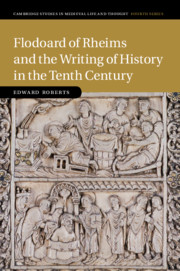Book contents
- Flodoard of Rheims and the Writing of History in the Tenth Century
- Cambridge Studies in Medieval Life and Thought
- Flodoard of Rheims and the Writing of History in the Tenth Century
- Copyright page
- Dedication
- Contents
- Tables
- Acknowledgements
- Abbreviations
- Introduction
- Chapter 1 Flodoard, His Archbishops and the Struggle for Rheims
- Chapter 2 Narrative and History in the Annals
- Chapter 3 Institutional History and Ecclesiastical Property
- Chapter 4 History, Poetry and Intellectual Life
- Chapter 5 Flodoard’s Age of Miracles
- Conclusion
- Bibliography
- Index
Chapter 5 - Flodoard’s Age of Miracles
Published online by Cambridge University Press: 05 September 2019
- Flodoard of Rheims and the Writing of History in the Tenth Century
- Cambridge Studies in Medieval Life and Thought
- Flodoard of Rheims and the Writing of History in the Tenth Century
- Copyright page
- Dedication
- Contents
- Tables
- Acknowledgements
- Abbreviations
- Introduction
- Chapter 1 Flodoard, His Archbishops and the Struggle for Rheims
- Chapter 2 Narrative and History in the Annals
- Chapter 3 Institutional History and Ecclesiastical Property
- Chapter 4 History, Poetry and Intellectual Life
- Chapter 5 Flodoard’s Age of Miracles
- Conclusion
- Bibliography
- Index
Summary
Accounts of miracles and visions feature prominently in each of Flodoard’s histories. Notably, he recorded a huge number of wonders that occurred during his own lifetime. This constitutes a striking contrast with contemporary authors of history and hagiography, many of whom doubted whether miracles still happened or whether they were necessary. This chapter examines Flodoard’s attitude to the supernatural, asking in particular how it evolved over the course of his lifetime. I argue that Flodoard came to perceive miracles as validation of the work carried out by monks, clerics and bishops, and that he heeded seriously reports of visions and other phenomena as divinely inspired responses to moral failings. Flodoard contrasted the earthly vices of the leaders of the West Frankish kingdom with the greatness of spiritual power, thus providing a rationale for episcopal authority in a time of political upheaval.
Keywords
- Type
- Chapter
- Information
- Publisher: Cambridge University PressPrint publication year: 2019

